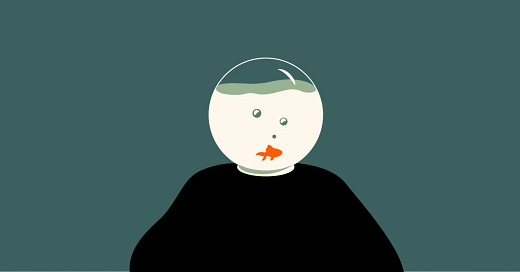#444: Is This The End Of Reading?
Also: The crux of masculinity, the joy of Diet Pepsi, and the intelligence of crows
Hi loyal readers! Great to see you. Before anything else, let me introduce a new experiment here at Article Club. Hope you like it.
💬 Let’s chat! Last week’s lead article, “Are White Women Better Now?” elicited strong reactions. Let’s chat about it. Next Tuesday 5/21, 5-6 pm PT, I’ll open a live text thread here for us to discuss. (If you can’t make it live, feel free to add your two cents afterward.) I’m looking forward to trying this out and seeing you there.
And now, back to regular programming.
I’ve been following the state of reading for a long time — as a teacher, non-profit founder, and general concerned citizen. It’s not looking good out there. People might be buying books, but they’re certainly not reading them very much. Other meaningful (i.e., not social media) reading is down, too. What is to be done? This week’s lead article, “Is This The End of Reading?” is a great one, especially if you’re a big reader like me who is a little bit scared as to what the future will bring.
Not interested in the inevitable demise of reading? Here are a couple more articles to check out. They’re about:
📚 All right, it’s time to get to the articles. If an article moved you, or elicited a strong reaction, I encourage you to share your perspective. Hit reply or leave a comment.
1️⃣ Is This The End Of Reading?
Some of this, we’ve heard before: Young people aren’t reading as much, and they’re not as skilled in reading, so they’re coming to class unprepared to read complex texts. Whether or not this is true, or a new phenomenon, it certainly doesn’t help to bemoan the state of reading without trying to do something about it.
That’s why I appreciated this article so much. Reporter Beth McCurtrie follows college professors as they grapple with how to teach their students in a post-print world. After all, as one professor says, “If you design a class based on the assumption that students will do the reading, you’ll get nowhere.”
After listing a litany of causes that explain the decline of reading — here we go: smartphones, the pandemic, poor reading instruction, testing culture, less homework in schools, less writing in schools, grade inflation, anxiety, isolation, that school is boring, that parents don’t read to their children, and more — this article focuses on the successes and failures of real teachers doing the real work. It’s not all happy and triumphant. “We all kind of feel lost these days,” one professor says.
➡️ In case you’re interested, here’s my hand-written annotated version.
By Beth McCurtrie • The Chronicle of Higher Education • 18 min • Gift Link
2️⃣ Masculinity: The Abstract Rage To Protect
“There is a difference between a man’s sense of protection and a man’s sense of violence,” a male friend once reassured me. But I never could tell the difference.
When Amanda E. Machado tells men that she was once sexually assaulted at a festival, with her ex-boyfriend nearby but lost in the crowd, they instantly become ashamed of him. “How could he let this happen?” they ask. “He was supposed to protect you.”
In this enlightening essay, Ms. Machado explores notions of masculinity, weaving personal experiences with the work of Phil Christman, a lecturer at the University of Michigan. Mr. Christman writes, “When I try to nail down what masculinity is — what imperative gives rise to all this pain seeking and stoicism, this showboating asceticism and loud silence — I come back to this: Masculinity is an abstract rage to protect.”
The biggest problem with this “abstract rage to protect,” Ms. Machado argues, is that there is a fine line between a desire to protect and a desire to inflict violence. “The aggression men learn to protect the women they love, becomes exactly how they hurt the women they love.”
By Amanda E. Machado • The Adroit Journal • 15 mins • Gift Link

3️⃣ My Guilty Pleasure Is My Old Friend, Diet Pepsi
After a once-a-day Coca-Cola habit that lasted from my childhood into my mid-20s, which left my brain addled on sugar, I quit cold turkey in April 2000 and have not looked back (except for the occasional Sprite). For Mireille Silcoff, her decision to return to her guilty pleasure, Diet Pepsi, stemmed from a desire to wean herself off her wine-drinking habit, which peaked during the pandemic and did not wane afterward, mostly because writing, she says, is stressful. In this quick essay, Ms. Silcoff recounts drinking her first can — “it tasted like seventeen!” — and reflects on how a good 20th century diet cola is “like an old friend.” Who cares if that friend is a little bit toxic? “Maybe life’s just a little more exciting for it,” she writes.
By Mireille Silcoff • The Walrus • 4 min • Gift Link
4️⃣ Best Of Article Club: The Crow Whisperer
After crows attacked their dog, harassed their baby, and followed them around their neighborhood in Oakland, Dani Fisher and Adam Florin knew they had to call the local crow whisperer in order to avoid a murder. In this delightful piece, Lauren Markham follows Yvette Buigues as she mediates conflicts between humans and animals and performs energy healing on people’s pets, like Ernie the bull terrier and Bodie the cat. “Animals store pain and memories just like we do,” she says.
➡️ This is a Best Of Article Club selection. Based in the East Bay, Ms. Markham is one of my favorite writers. She focuses on issues related to youth, migration, and the environment. Her article, “Our School,” was one of my favorites of 2017. She has also joined us twice on the podcast — including to share her thoughts on “The Crow Whisperer.” Ms. Markham is the author of the acclaimed book, The Far Away Brothers, about twins who escape from El Salvador and build new lives in California. She gets bonus points because she’s an educator, too.
By Lauren Markham • Harper’s Magazine • 22 min • Gift Link
Thank you for reading this week’s issue. Hope you liked it. 😀
To our four new subscribers — Rhonda, Piotr, Abhina, and Antonio — I hope you find the newsletter a solid addition to your email inbox. Welcome to Article Club! Make yourself at home.
If you appreciate the articles, like the gift links, value our discussions, and in general have come to trust that Article Club will have better things for you to read than your current habit of incessantly scrolling the Internet, please consider a paid subscription.
If subscribing is not your thing, no worries: There are other ways you can support this newsletter. Recommend the newsletter to a friend, leave a comment below, send me an email, or leave me a voicemail. I’d like hearing from you.
On the other hand, if you no longer want to receive this newsletter, please feel free to unsubscribe below. See you next Thursday at 9:10 am PT.







